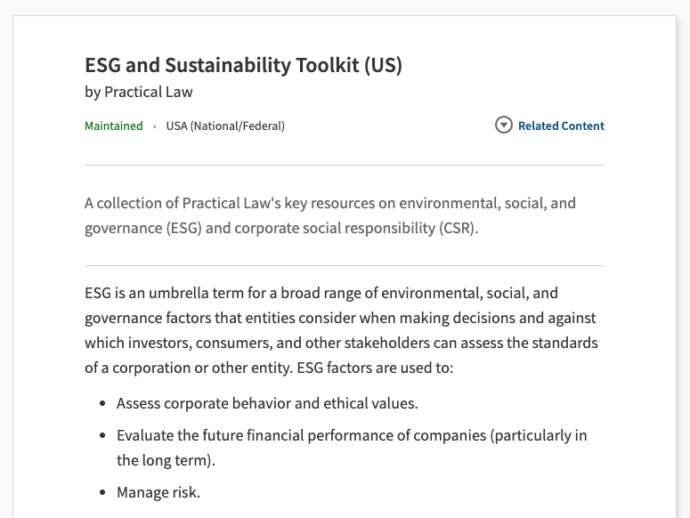Part 2
Welcome to part two of our three part series on the importance of environmental, social, and governance (“ESG”) to in-house lawyers – and the companies they serve. In part one, we discussed the critical role of environmental issues (the “E” in ESG). Today we discuss the importance of the “S” – the social part of ESG.
While one may think the social part of ESG is “fluff” and aspirational, it is grounded in compliance and other legal obligations; and can have a dramatic impact on the success of any business.
For in-house lawyers, especially those managing risk and compliance, understanding the “S” in ESG is not just a matter of corporate responsibility but is essential to ensuring legal compliance, mitigating risk, and navigating stakeholder expectations (internal and external).
Jump to ↓
| What is the “S” in ESG? |
| What happens if we just ignore these social factors? |
| Backlash and balancing differing stakeholder views |
What is the “S” in ESG?
In part one, we discussed broadly why ESG matters at all. I will not repeat that discussion here. Instead, let’s look at the “S.” The “S” in ESG refers to certain social factors that cover wide range of business and legal issues, including labor practices, regulatory compliance, employee health and safety, workplace diversity, charitable endeavors, and how the company interacts with the community, i.e., its reputation. These issues, in turn, impact the company’s operations (and the bottom line), in particular its ability to attract and retain talent and, even more importantly, its ability to make a profit. For in-house lawyers, here is a partial list of why prioritizing the “S” in ESG should be top of mind for the legal department:
- Regulatory and legal compliance: Many “social” issues involve labor and employment law, data use and security, anti-discrimination regulations, and workplace safety laws. Similarly, some social issues are part of mandatory sustainability reporting for public companies. All issues that fall squarely under the purview of the legal department. Failure to comply with these laws can result in significant legal liabilities, including lawsuits, regulatory fines, and even criminal penalties. Moreover, if your company operates globally, it must comply with laws very different than those in place in its home country, e.g., regulations related to social issues—such as wage equity, diversity reporting, human rights, and worker protections.
- Contracts: In-house lawyers frequently see contractual clauses dealing with social responsibility, be it supplier codes of conduct to yearly audits of compliance with such codes. While it’s easy to just say “yes” and forget about it, smart in-house lawyers spend time ensuring the business can in fact comply with such codes as that are now contractual commitments and subject to litigation.
- Risk mitigation: Issues such as poor labor conditions, discriminatory employment practices, etc. can lead to lawsuits, regulatory actions, or shareholder lawsuits (or proxy fights). In-house lawyers can help their organizations proactively address potential risks before they escalate into material legal or financial problems.
- Reputation: Companies that ignore social issues can suffer reputational damage, which can erode trust with customers, employees, investors, and other stakeholders. A company’s reputation is one of its most valuable assets, and reputational harm can have long-lasting effects on profitability, customer loyalty, and employee engagement. In-house counsel is often tasked with helping to protect the company’s reputation by putting policies and other mechanisms in place to help ensure that it adheres to legal requirements, contractual obligations, ethical standards and, pragmatically, treats employees, customers, and communities fairly.
- Investor and consumer expectations: Investors are increasingly placing importance on ESG metrics when making investment decisions. Companies that fail to meet “social standards” may find themselves excluded from investment opportunities. Similarly, consumers are more socially conscious and are often willing to support companies that demonstrate strong commitments to ethical practices. The legal department has a role to play here as well.
 |
What happens if we just ignore these social factors?
Ignoring or deprioritizing the social factors in ESG can lead to a host of problems for companies, many of which carry material legal and financial risks. In-house counsel must be aware of these risks to help advise the company, both legally and strategically:
- Legal exposure: Failing to comply with labor laws, sourcing laws, anti-discrimination regulations, or health and safety standards as a result of poor due diligence can result in costly lawsuits and fines. For example, a company that ignores workplace safety regulations may face penalties from regulatory bodies such as OSHA (Occupational Safety and Health Administration). Social issues like wage disparities or gender discrimination can lead to class-action lawsuits, which can be both financially and reputationally damaging.
- Regulatory fines and sanctions: Governments around the world are increasingly legislating social issues. For example, the EU’s Corporate Sustainability Due Diligence Directive requires companies to address human rights violations in their supply chains. Non-compliance with such regulations can result in fines and heightened scrutiny from regulators.
- Reputational damage: The reputational consequences of neglecting social issues can be severe. Companies that are exposed for poor labor practices, human rights violations, or a lack of diversity can suffer from boycotts, negative press, and social media backlash. This can lead to a loss of consumer trust and, ultimately, a decline in sales, brand value, and – if publicly traded, share price (which in and of itself can bring on significant litigation).
- Talent loss: Employees expect their employers to put some type of priority on social factors such as diversity of talent, fair wages, and safe working conditions. Companies that fail to meet these expectations may struggle to attract and retain top talent, leading to high turnover rates and decreased productivity.
- Investor concern: As more investors incorporate ESG criteria into their investment strategies, companies that fail to meet such expectations may face divestment or reduced access to capital.
 |
Backlash and balancing differing stakeholder views
In part one, we talk about “the other side of ESG.” That is certainly true here. Prioritizing social issues is not without challenges. Companies may face backlash from certain segments of stakeholders who view social responsibility initiatives as unnecessary, costly, or politically motivated. In-house lawyers are uniquely positioned to help their organizations navigate these tensions:
- Understand the pushback: It’s important to understand why certain stakeholders may react negatively to the company’s social responsibility initiatives. For example, some shareholders may view social initiatives as detracting from short-term profitability, while other may feel that the company is overstepping by taking a political stance.
- Communicate the business rationale: Clearly communicate the business rationale for prioritizing social factors. Addressing social issues is not just about “doing the right thing” but is a sound business decision that mitigates legal risks, protects the company’s reputation, and enhances long-term profitability. Training employees on “why” this all matters is important too.
- Be transparent: Transparency is key when managing differing stakeholder views. Be open about the company’s social initiatives and explain why they are being implemented. Regularly update stakeholders on progress and outcomes and provide opportunities for feedback (positive and negative).
- Balance short-term and long-term profitability: While some social initiatives require upfront investment, they often lead to long-term gains in the form of reduced legal risks, enhanced employee productivity, and improved customer loyalty. Explaining this is critical to stakeholders understanding the “why” social initiatives make sense.
- Prepare for crisis: Despite all of these efforts, social initiatives may provoke significant backlash from certain stakeholders and the company can find itself the target of a boycott or unflattering press (or even regulator scrutiny). A crisis management plan is critical to responding to such issues and in-house counsel have a leading role to play in creating the playbook.
Understanding the “S” in ESG is key for in-house lawyers looking to manage legal risks, protect the company’s reputation and shareholder value, and ensuring compliance with evolving regulations and contractual agreements. Still, social issues in particular require careful balancing of stakeholder expectations, particularly in the face of potential backlash. If you have Practical Law, your legal team is armed with tools and resources, including globally-focused, to help the company get the “S” in ESG right.
 |










